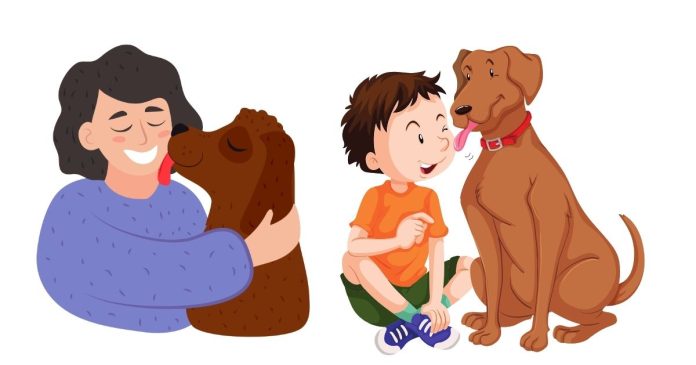When your dog licks you excessively, it could be due to a variety of reasons. While licking is a natural behavior for dogs, excessive licking may point to specific emotional, physical, or behavioral causes. Here are some common reasons why your dog might be licking you more than usual:
1. Affection and Bonding:
- Dogs often lick as a way of showing affection and building a connection with their owners. This behavior is a way for dogs to show love, similar to how they might lick other dogs in their pack. If your dog licks you frequently, it could simply be their way of expressing affection and reinforcing the bond between you.
- What to look for: If the licking is accompanied by wagging of the tail, calm body language, and other affectionate behaviors, it’s likely just a sign of love.
2. Seeking Attention:
- Licking can also be a behavior your dog uses to get your attention. If you respond positively when your dog licks (such as petting them, talking to them, or giving them treats), your dog may learn to lick you more often to get attention.
- What to look for: If the licking is persistent, especially when you’re engaged in other activities (like working or watching TV), your dog may be trying to grab your attention.
3. Taste or Scent:
- Dogs are curious creatures and may lick you because they’re attracted to the taste or smell on your skin. If you’ve recently applied lotion, had food, or sweat, the scent might intrigue your dog.
- What to look for: If your dog licks specific areas of your body (e.g., your hands, face, or arms), it could be because of a taste or scent they’re attracted to.
4. Stress or Anxiety:
- Some dogs lick excessively when they feel stressed, anxious, or insecure. Licking can be a self-soothing behavior to help them cope with nervous energy. This is especially common in dogs that are experiencing separation anxiety, changes in their environment, or other stressful situations.
- What to look for: If the licking is more pronounced during times of change or when your dog seems anxious (such as when you leave the house or when there are loud noises), it may indicate anxiety.
5. Health Issues:
- If the licking is new or has become excessive, it could be a sign of an underlying health issue. Dogs may lick in response to physical discomfort or pain. This could include things like allergies, skin infections, or digestive issues. If your dog’s licking is accompanied by other symptoms like excessive scratching, hair loss, or vomiting, it’s a good idea to consult a vet.
- What to look for: If your dog’s licking seems obsessive, is focused on one particular area of their body (such as paws or legs), or is accompanied by other signs of distress (such as drooling, limping, or behavioral changes), a vet visit might be necessary.
6. Grooming Behavior:
- Dogs lick themselves as part of their grooming routine. If your dog licks you, it might be attempting to “groom” you as well, especially if they see you as part of their pack or family. It’s a natural instinct in dogs to care for others by licking.
- What to look for: This behavior tends to be more gentle and less persistent than licking done for attention or anxiety.
7. Instinctual Behavior:
- In the wild, dogs and wolves lick to show submission or to communicate with pack members. If your dog is licking you excessively, they might be displaying this instinctual behavior as a sign of deference or connection.
- What to look for: If your dog’s licking is paired with submissive body language (like laying on their back or avoiding eye contact), they may be expressing their submission or seeking your approval.
8. Boredom:
- Dogs that are left alone for extended periods, or those who don’t get enough exercise or stimulation, may engage in excessive licking as a way to pass the time. Licking can become a coping mechanism when a dog is bored or has excess energy.
- What to look for: If your dog licks more frequently when they’ve been left alone or have not had a walk or playtime, it may be a sign that they need more mental or physical stimulation.
How to Address Excessive Licking:
- Provide Mental Stimulation: Ensure your dog gets enough physical and mental exercise through walks, interactive toys, and training sessions. A tired dog is less likely to engage in excessive licking.
- Reduce Stress: If anxiety is the cause, try to identify and reduce the sources of stress. Consider using calming products like pheromone diffusers, anxiety wraps, or providing a safe, quiet space for your dog.
- Monitor Health: If you suspect that your dog’s licking is due to health issues, make an appointment with your vet to rule out allergies, infections, or other medical conditions.
- Redirect Behavior: If your dog licks to get attention, try to redirect the behavior by giving them something else to do when they start licking, like asking them to sit or offering a chew toy.
Ultimately, understanding the cause of your dog’s licking is key to managing the behavior. If you’re concerned or the licking seems excessive or out of character, it’s always a good idea to consult a veterinarian for a more accurate diagnosis.
Related posts:
- What does ringing in the ears mean spiritually?
- What Colors Do Blue and Green Make?
- How Long Does Raw Chicken Really Last in the Fridge?
- What are some amazing and memorable Valentine’s Day ideas that will leave a lasting impression?
- What is the definition of ‘friends with benefits?
- What is the difference between a bachelor’s and a degree?


